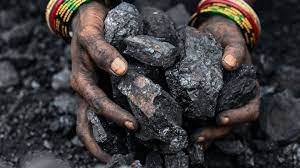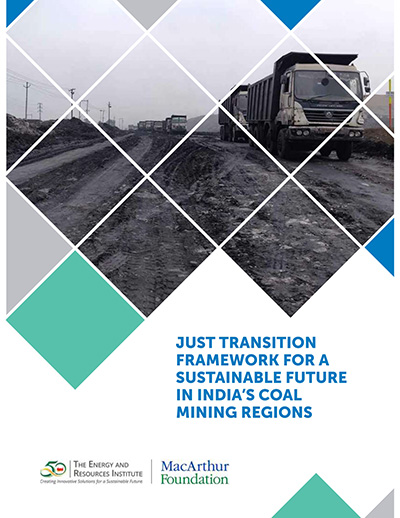Just Transition

Just Transition Framework for a Sustainable Future in India’s Coal Mining Regions
As India's energy mix diversifies, there is increasing attention on achieving a fair and equitable transition that considers the impacts on workers, communities, the environment, and related industries. To address this, TERI has developed a Just Transition Framework, informed by extensive research in India's eastern coal-belt and engagement with diverse stakeholders.
Grounded in theories of procedural, distributive, and restorative justice, the framework aims to facilitate a structured transformation to address concerns in regions affected by coal mine closures. It proposes a two-pronged approach involving institutional changes at various levels of governance and targeted interventions focusing on consensus-building, socio-economic transformation, and environmentally friendly development.
Each aspect of the framework aligns with principles of justice and is supported by specific interventions tailored to different governance levels. The framework also includes a comprehensive mapping of stakeholders, challenges, risks, and indicators for change, providing a detailed understanding of just transition dynamics at the grassroots level and a monitoring mechanism. Case studies from global regions undergoing coal mining reforms are used to illustrate each focus area, and the report outlines a phased plan aligning interventions at national, state, and district levels toward India's net-zero emissions target by 2070.
Gender-Just Transition: 'Establishing women as critical stakeholders in India’s just energy transition: Evidences from Odisha, Jharkhand and Chhattisgarh'
Coal continues to remain the mainstay of India’s energy portfolio mix. The climate change considerations and the increasing competitiveness of cleaner sources of energy are likely to increase the momentum of the transition towards non-fossil fuel-based sources. According to an estimate, this move would impact approximately 13 million people who are dependent on coal either directly or indirectly for a livelihood.
Women form only 6.7% of the coal workforce according to figures from Coal India Limited (CIL), but this number only includes women who have regular employment with the company. Approximately 70% of India’s coal workforce is estimated to be informal - casual or contract labour. This is where a large number of women are likely to be concentrated. It is important therefore to bring about a just transition incrementally towards non-fossil fuel-based options that is sensitive to the gendered impacts of decarbonization as “there is no climate justice without gender justice”.
In this backdrop, TERI has drafted a discussion paper titled ‘Establishing women as critical stakeholders in India’s just energy transition: Evidences from Odisha, Jharkhand and Chhattisgarh’ which is part of the larger project on Just Transition supported by MacArthur Foundation. This paper highlights the gender perspective of vulnerability present in the coal-producing geographies of India. Under-representation in the energy sector, the concentration of women in informal work, loss of agricultural and homestead land, unemployment-induced alcoholism and domestic violence, and lack of agency in decision-making at the institutional level, are some of the keys issues that exacerbate women’s vulnerabilities in the light of the transition to a net zero pathway, if left unaddressed.
Insights from in-depth fieldwork carried out in Odisha and Chhattisgarh have prompted us to frame recommendations for a gender-just energy transition. A specific focus on women and their issues misses the emphasis that it requires. Through this paper, we thus argue for the need to establish women as critical stakeholders in just transition dialogues and make future policies more gender-inclusive.
It is the need of the hour to take a closer look at the fossil-fuel economy, environment, people, market opportunities and other players/stakeholders. An action research agenda in the coal producing belts could create a ground for further reflection and trigger a futuristic worldview that envisages greater inclusion and equity. While transitioning to the envisaged non-fossil fuel economy in time, it is crucial to map implications of coal phase-out and create a blueprint for a proactive planning and an inclusive, fair and humane transition.
Just transition lens offers an insightful understanding about how one takes a holistic view of energy, climate and development considerations in order to effectively deal with energy, technology and socio-economic barriers and envision newer opportunities. While retaining focus on de-carbonisation and seeding cleaner energy options, we cannot afford to lose sight of the human dimensions as socio-economic factors like lives and livelihoods of vulnerable segments of population who are at a greater risk, access to services and opportunities, rights and entitlements, local and institutional capacities, etc.
Building a just transition framework to focus on comprehending the overall scenario, coal value chain and carrying out a situational analysis through taking a deep dive in coal producing belt, and recommending a way forward for planned coal phase down/out is the key intent of the project.
The Just Transition project supported by MacArthur Foundation aims to look at the following aspects:
- Build a knowledge base on the content that is central to protecting the lives and livelihoods of communities in transition that yet has not received much attention
- Design a strategy for effective outreach to facilitate the setting up of a consultative group for just transition dialogues
- Testing some of the elements of the research product in the field
- Share research products with the stakeholders working on issues of transition, to facilitate learning and adapt practices accordingly
- Develop a framework with outcome-based indicators for just and equitable transition
The project focuses on the coal mining industry (i.e., upstream side) in order to explore opportunities of addressing the implications on coal-dependent communities among coal-rich states in India and will also focus on the coal-dependent MSME sector (i.e., downstream side) to ascertain impact on MSME workforce in selected coal consuming sectors/regions and their reskilling needs.
Expected outcomes of this study:
- The emergence of a holistic understanding and a body of knowledge that would guide futuristic thinking, policies, and action
- Development of a participatory, result-based, and action-oriented framework for Just transitions in coal mining and coal using the MSME sector
- Generation of a database that would help predict risks, opportunities, plan mitigation and measure transformation. This will also be useful for other research think tanks and academicians in the country.
- Scientific inquiry resulting in a compendium would help generate a greater awareness leading to factoring “just transition” in any development and policy discourse and enabling decision-making bodies, industries, civil society, and people at large in making an informed choice.
To know more, Visit website



